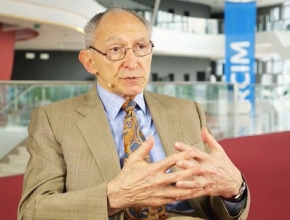Should female patients with a history of proximal thrombosis (affecting iliac vein or inferior vena cava) plan to become pregnant? What should be our recommendation for such patients? Does lack of recanalization of the affected vein pose additional problems?
Shannon Bates: I do not think women should regard having a previous thrombotic event, whether it is a pulmonary embolism (PE) or deep vein thrombosis (DVT), as an absolute contraindication to pregnancy. It does make their subsequent pregnancy more complicated and we do need to be careful.
The first [thing] is that you obviously would like the patient to be adequately treated for their DVT or PE before becoming pregnant. [There are] no studies to base this on but my recommendation would be you would want at least a good 3 months of full-dose anticoagulant therapy. If the patient has made a good clinical recovery after that event, whether it was from PE or from extensive DVT, then you can consider pregnancy, but you need to think about what you can do to prevent a recurrent event. At minimum, this woman is going to require is postpartum prophylaxis, and then, depending on the setting in which her first clot occurred, she may need antepartum prophylaxis as well.
If the first event was hormonally related or unprovoked, then, for sure, the woman should receive some type of anticoagulants during her pregnancy. If the event was associated with another risk factor, say, leg casting that is now resolved during hospitalization, it is not clear that she would require prophylaxis, and that would need to be a discussion with the patient, depending on what risk of recurrence she is willing to accept. But the more proximate the pregnancy is to when the thrombosis was diagnosed, the more likely she should receive prophylaxis during any subsequent pregnancy.
You are concerned about risk of recurrence and future damage to the leg. But again, that might be someone that you would prophylax more aggressively; instead of a prophylactic dose you might put them on a therapeutic dose. So it would again depend on the woman, but I do not think you can say that even an extensive prior history of VTE should act as an absolute contraindication. The decision is really based on what you think the risk of recurrence is, what risk of recurrence the woman is willing to accept to have the option of becoming pregnant, and what strategies you can use to mitigate the risk of recurrence. And obviously, if you are very concerned, then your option is to use therapeutic doses of anticoagulation, where your risk of recurrence is going to be exceptionally small.
You are going to have to also utilize strategies in order to prevent worsening of varicose veins that she may have developed, or superficial veins, so she is going to need to be willing to wear compression stockings throughout her pregnancy and be closely monitored for the condition of her veins throughout.
 English
English
 Español
Español
 українська
українська











